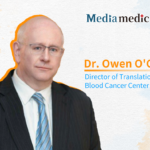
Multiple myeloma (MM) has long been a focus of hematology research due to its complex nature and the challenges it presents in treatment. As treatment methods continue to advance and new drugs emerge, patient survival rates and quality of life are receiving unprecedented attention. In this context, the accurate measurement of patient-reported outcomes (PROs) becomes increasingly important. It not only helps us gain a deeper understanding of patients’ real experiences but also provides guidance for developing more precise treatment strategies. At the 29th Annual Congress of the European Hematology Association (EHA 2024), held from June 13-16, Dr. Edward Laane from Tartu University in Estonia presented groundbreaking research that not only made significant strides in MM treatment but also offered new perspectives and methods for the standardization of PRO measurements. Hematology Frontier invited Dr. Edward Laane to share his team’s research findings and his special insights from the conference.A Shared Endeavor: Academic Exploration and Innovation at the EHA Congress
Hello everyone, I am Edward Laane, currently working in clinical hematology in Estonia and serving as the Chair of the “Quality of Life and Symptoms” Scientific Working Group (SWG) at this EHA meeting. I consider the EHA Congress a highly prestigious academic event. The conference venue, the overall organization, and the arrangements were all excellent.
The EHA Congress is renowned for its diverse and in-depth content. At this academic gathering, we witnessed a broad range of topics and in-depth discussions in the field of hematology. From breakthroughs in basic research to innovations in clinical applications, from interdisciplinary collaborations to international cooperation case studies, every aspect of the conference was meticulously designed to ensure that participants could engage with cutting-edge findings and clinical practice outcomes. The program was rich and varied, including a series of keynote speeches, joint workshops, and poster presentations, providing attendees with comprehensive learning and networking opportunities. These sessions not only covered all branches of hematology but also paid special attention to emerging fields such as precision medicine, gene editing technology, and personalized treatment approaches. Additionally, the EHA Congress focuses on nurturing the next generation of hematology researchers and clinicians, setting up sessions specifically for young researchers, encouraging them to share their research findings and engage deeply with leading experts. Such an academic environment will undoubtedly further propel progress and innovation in the field of hematology.
Listening to Patients’ Voices: Integrating PRO Standardization with Clinical Practice
At this conference, I presented our team’s research on “Quality of Life and Symptoms: Barriers and solutions in the assessment of patient-reported outcomes (PROs) in clinical trials and routine care: Where we are and how to proceed?” Accurate measurement of PROs is crucial for understanding the quality of life and symptom burden of patients with hematologic malignancies. As Chair of the EHA SWG, I deeply recognize the critical role of PROs in clinical research. We are committed to establishing evidence-based guidelines for PRO measurement in hematology clinical trials and emphasizing patient-centered approaches by collaborating with patient advocacy organizations to ensure the practical utility of these guidelines.
Our research systematically assessed the inconsistencies in PRO measurement and reporting in MM clinical trials, highlighting the necessity for standardization. We also analyzed the challenges in classifying non-Hodgkin lymphoma (NHL) and suggested a unified definition and separate study of different NHL subtypes. Through a rigorous screening process, we selected 495 studies from 8,349 records for detailed analysis, underscoring the importance of standardized PRO measurement tools. Despite the widespread recognition of the importance of PROs, our research indicated that most clinical trials do not consider them as primary endpoints, revealing a lack of emphasis on PROs. Therefore, adhering to the EHA SWG guidelines and incorporating PROs into clinical trials is crucial for improving the quality of treatment planning and patient care.
Moreover, I am particularly interested in the field of myeloma, especially the presentation by Professor Andrew J. Cowan on “Anti-CD38 Antibody Retreatment in Patients with Relapsed/Refractory Multiple Myeloma Previously Treated with Lenalidomide and an Anti-CD38 Antibody: Real-World Data Using the US Flatiron Database,” which I found extremely inspiring.
Moving Forward Together: Promoting Innovation in Hematology
Although I have never visited China, a land full of vitality, I have always held great respect and interest in China’s field of hematology. China, with its large population and rich cultural heritage, has shown tremendous potential and influence in medical research and clinical practice.
I often hear that even a small county in China can have a population of over a million. This deeply impresses me with the vastness and diversity of China. I understand that my colleagues in Chinese hematology are not only making continuous strides domestically but are also achieving remarkable successes on the international stage, contributing significantly to the global advancement of hematology.
In this era of rapidly evolving knowledge, the power of knowledge is boundless. I sincerely encourage everyone to continue pursuing academic depth and breadth, constantly exploring the unknown realms of hematology. Hematology is a field full of challenges and opportunities, concerning the mysteries of life and the health and future of humanity. Being a hematologist is a noble and great mission.
I believe that through our joint efforts, whether in China or elsewhere in the world, we can bring more hope to patients. I look forward to collaborating with you all to advance the field of hematology and contribute to the cause of human health.


